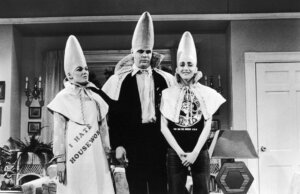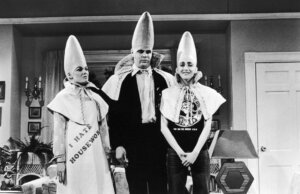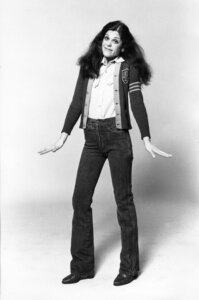Uncategorized
Satire on ‘Saturday Night Live’ used to be a deadly weapon; is it still enough in the Trump era?

A funny thing happened when I went to Austin last week. My youngest child, Basil, a junior at the University of Texas, and I paid a visit to the university’s Harry Ransom Center.The crown jewel of UT, the Center is named after its founder, Harry Huntt Ransom, who began as a professor of English at the university and ultimately became its visionary president. In a speech he gave to the Philosophical Society of Texas in 1956, he declared “that there be established somewhere in Texas — let’s say in the capital city — a center of cultural compass, a research center to be the Bibliothèque Nationale of the only state that started out as an independent nation.”

Nearly 75 years later, the massive stone and glass building in the heart of the campus stands as the realization of Ransom’s dream. The Center’s holdings include nearly one million books along with some 42 million manuscripts, five million photographs, and 100,000 works of art; the manuscripts of Gabriel Garcia Marquez, Doris Lessing, Jack Kerouac and Ezra Pound are here; so are the papers of Albert Einstein and Robert de Niro; even original works by Frida Kahlo and Pablo Picasso.
Three of those last four iconic figures also appear in the Ransom Center’s most recent acquisition: the papers of Lorne Michaels.
Born Lorne Lipowitz in Toronto in 1944 — and not, as some folks still believe, on a kibbutz in Israel — Michaels is, of course, the creator of Saturday Night Live, the weekly NBC television comedy show that has been running, and often stumbling, since 1975. (Now 80 and with no plans to retire, Michaels has said he would like “Uneven” inscribed on his tombstone.)
The collection begins with Michaels’ years in theater productions at the University of Toronto and his early work in television — including his stints with The Beautiful Phyllis Diller Show in 1968 and, that same year, Rowan & Martin’s Laugh-In — before moving on to the half-century of SNL as well as the dozens of films on which Michaels served as producer.
As my Longhorn and I visited the just-opened and eye-popping SNL exhibit, I noticed, with a surge of verklempt, the index cards that Michaels tacks to a bulletin board every Friday, outlining the segments of the following night’s show. The show, after all, has to go on — a huge weight for a handful of cards to carry. According to his recent biographer Susan Morrison, Michaels often shakes his head slowly as he gazes at the index cards, concluding “We have nothing.”
But as anyone with a good memory or, lacking that, a good pair of walking shoes knows — the exhibit covers figuratively and literally a good deal of ground — there is much ado, and much to do, with that nothing. It is impossible to exaggerate the show’s impact on American culture and politics. There are, of course, the gag lines that have bled into everyday usage where the user usually has no idea of the line’s origin, such as Gilda Radner’s Emily Litella, who ends every misunderstanding with “Nevermind” and Stuart Smalley aka Al Franken’s mantra: “I’m good enough, I’m smart enough, and doggone it, people like me.” And, of course, the motivational blast of Matt Foley, played by Chris Farley, “I live in a van down by the river” as well as, yes, Mike Myers’ Linda Richman, who punctuates her monologues with “I’m getting a little verklempt.”
Yet, while this sort of humor zeroes in on cultural fads and ethnic tics, SNL has also specialized in satire with political bite, such as Will Ferrell’s coinage “stratergery” in his brilliant impersonation of George W. Bush — which, hilariously, Dubya proudly assumed he had himself coined — or the 2016 debates between Alec Baldwin’s Donald Trump and Kate McKinnon’s Hillary Clinton. In a small theater at the exhibit, this very sketch was repeatedly replayed. As I watched and listened — not for one, but two replays — I noticed that the knots of visitors, while mesmerized, did not often laugh. The silence was especially loud when Baldwin, playing Trump, suddenly given two more minutes to talk, lurches into this hallucinatory riff:
“The thing about the Blacks is that they’re killing each other. All the Blacks live on one street in Chicago, all on one street. I just read that this morning. It’s called ‘Hell Street’. And they run Hell Street and they’re all just killing each other. Just like I am killing this debate.”
In 2016, silence from the audience in Studio 8H would have been unimaginable; a decade later, laughter seems equally unimaginable. With the events now unfolding in Chicago and other “Democrat” cities under Trump 2.0, Baldwin’s rant is more a matter for laments than laughs. Perhaps some of the visitors wondered, as I did, what the Republican state leaders, housed just a short walk away in the capitol, would have thought of their state’s premier university showcasing this sketch. (One need not wonder very long,though, given that Jay Hartzell, the university’s former president, decided to resign rather than resist pressures from crusading Republicans to enforce the state’s ban on the use of DEI.)

Perhaps more important, the sketch raises a question worthy of “Coffee Talk” as well as for our collective and growing vibe of verklempt: Is comedy, even the middle of the road satiric fare at which SNL excels, the proper response to the tragic situation our country now faces? The answers to this question, long debated by political thinkers and actors, generally fall into two camps. In the first camp are those who believe that laughter is subversive, a weapon of the weak that reveals, through mockery and, as Dubya might say, snarkery, the incoherence of their justifications for taking power and the corruption that inevitably follows.
In short, comics show us an emperor with no clothes. This is a notion that Trey Parker and Matt Stone of South Park, unlike Michael’s middle-of-the-road SNL, have taken quite literally this year.
But as those in the other camp point out, even the sight of a butt-naked Donald Trump in bed with Satan has hardly dented the standing of a man who would be emperor. This camp’s slogan, to paraphrase W.H. Auden’s famous line about poetry, is that comedy makes nothing happen. Or, even more discouraging, it makes matters even worse. Comedy distracts us from grave matters at hand and, by diluting every event through entertainment, deadens our sense of outrage at the sheer cruelty and stupidity of this administration. Amusement, the sociologist Neil Postman observed 40 years ago, is “the supra-ideology of all discourse on television.”
Even, it seems, when the entertainment might qualify as Jewish humor. The efforts that have been made to explain Michaels’ humor, and that of SNL, through the prism of Michaels’ Judaism have mostly fallen flat for a simple reason: When Lorne Lipowitz opted to become Lorne Michaels, the biographer Morrison suggests, he also opted out of his Jewish upbringing. Morrison quotes one colleague who said that Michaels’ “yeah-yeah-yeah-yeah” verbal tic “is the one bit of Jewishness still left in him.” And yet, a way of being and seeing is not so easily uprooted. In Morrison’s book, Conan O’Brien marvels at his old boss’s achievement: “A Jewish kid who started out with a furrier for a father, and he somehow makes it to this place? Our insecurities, our defense mechanisms, are what we use to survive, and they build up, like plaque.”
Those insecurities and defense mechanisms, so fundamental to Jewish humor, are no longer unique to Jews in the Age of Trump. When we left the Ransom Center, Basil and I chatted about this subject. They thought there was something Jewish, or at least Jewishy, about the show. When I asked what made for Jewish humor, they paused before replying that it was self-deprecating yet also irreverent. This observation struck me as right, but also worrying. When the target of our humor is a president whose utter lack of reverence for our nation’s laws and norms endangers us all, irreverence makes for a dubious weapon, even for the weak.
The post Satire on ‘Saturday Night Live’ used to be a deadly weapon; is it still enough in the Trump era? appeared first on The Forward.
Uncategorized
Forever curious, never daunted, Frederick Wiseman sought to repair the world through film

Frederick Wiseman, whose 60-year project of quietly asking America to look at itself — without sermon or embellishment, yet wielding the camera with an ethical ferocity‚ has died at the age of 96. Wiseman was a documentarian par excellence, but — as his year-long 2010 MOMA retrospective and his winter-long 2025 Lincoln Center appreciation show — he was more than a filmmaker and more dynamic than the institutions he critiqued. The 45 films he made between 1967 and 2023 embody the very process of American self-reflection.
Born Jan. 1, 1930, in Boston, Mass., Wiseman grew up in a Jewish household that never made a big show of its Jewishness, yet never let it slip from mind. His father, Jacob Leo Wiseman, was an accomplished lawyer; his mother, Gertrude Leah Kotzen, had a number of jobs but Wiseman once told the Forward that “not being able to study acting was her life’s regret.” In countless interviews, Wiseman described his upbringing as secular but culturally Jewish — one with plenty of Yiddish and the Forverts on the kitchen table. It was a childhood that inculcated a moral restlessness that he would spend his entire creative life channeling through film.
Before the camera, there was the classroom: Williams College, then Yale Law School. Law was his first chosen arena, and there is something telling in that. To make a good lawyer, you need curiosity, patience and the stamina to sit with contradiction. Wiseman found the law constricting and he turned, gradually and then completely, to filmmaking, where the rules were up for grabs but the moral stakes were never abstract.
After helping to produce Cool World, a 1965 feature about drug addiction, violence and economic hardship set in Harlem, Wiseman bought a 16mm camera and went to Bridgewater State Hospital to film Titicut Follies. His first film remains one of his most notorious, not least for influencing Miloš Forman’s 1975 One Flew Over the Cuckoo’s Nest. The state hospital for the criminally insane becomes, through Wiseman’s lens, both theater and trial. The patients are on display for us as are the guards but we, the audience, are on trial too: How do we treat the weakest among us? How do we look away?

Although the film represents an early example of his unobtrusive style, it was so uncomfortably honest that the Massachusetts government succeeded in banning it from general American distribution for 20 years. It was the first known film to be censored for reasons other than obscenity, immorality or national security. This is where his Jewishness lived — in the refusal to flinch from the unspeakable. Wiseman spent six decades getting us to see what we really mean by the places we build, the rules we enforce, and sometimes the people we push to the margins.
His “reality fictions,” as he preferred to call them, are quiet but not passive. They have no narration — no voice-of-God explanations or neat moral conclusions. The camera simply sits, bearing witness to public housing in Chicago, an inner-city high school in Philadelphia, Boston city government, a Dallas department store, a welfare office, a library in Queens, smalltown Indiana, and two views of domestic violence in Florida. What emerges is an archive of American power and American fragility.
Even more than his contemporaries D.A. Pennebaker and the Maysles brothers, Wiseman avoided tying his stories into a single ideological bow. But, just like his friend and follower Errol Morris, he never stopped asking questions. He once said he disliked the word “documentary” because it suggested a neatness and authority that reality refuses to offer. Like a scribe working on a Torah scroll, Wiseman would spend a year or more in his editing room shaping hundreds of hours of footage into a final cut.
Every editing choice was an act of interpretation, and every interpretation was a kind of moral accounting. To watch a Wiseman film is to practice a secular version of cheshbon nefesh — an accounting of the soul. We see the small humiliations of bureaucracy, the quiet heroism of nurses, the petty tyrannies of principals, the warmth and indifference that coexist inside every institution. His films remind us that institutions, including marriage, are made up of people, and people are both better and worse than the systems they create.
Though Wiseman never foregrounded his Jewishness in public, it filtered through his choice of subjects — and his abiding belief in the dignity of ordinary lives. He loved the messy, pluralistic, contradictory spaces where authority and people meet, like a library, a community center, a city council meeting. He loved making films and was annoyed not to be able to film or edit after his 2023 feature, Menus-Plaisirs – Les Troisgros, about a Michelin three star-restaurant and the family that runs it.
He once called his films “epic poems,” but they are also commentaries, in the rabbinic sense: teasing out what is hidden in plain sight, turning it over and over until it yields something that might help us live with ourselves. Wiseman was excited in 2025 when a group of archivists finished the process of restoring and digitizing 33 of his films so that his entire oeuvre can be more easily examined for years to come.
Wiseman’s focus was mainly on the United States, though he did film elsewhere — especially in Paris where he filmed at a strip club and a dance rehearsal at the Paris Opera Ballet. In later years, when asked how he chose what to film, he said simply: “Curiosity.” But curiosity, for Wiseman, was never passive. It was a demand to see. In this, he practiced a form of tikkun olam — repair of the world — that was all the more radical for being so understated. He didn’t shout. He didn’t score cheap points. He invited us to do the hard work ourselves.
He was honored, eventually, by the very institutions he made his life’s work dissecting. A MacArthur “Genius Grant,” a Guggenheim Fellowship, an honorary Academy Award, the Golden Lion for Lifetime Achievement in Venice. Yet he remained — in temperament and in practice — the same outsider who first brought his camera to that state hospital in 1967, sure only that the camera should watch and listen, and that we should, too.
Wiseman’s wife Zipporah Batshaw passed away in 2021 but he is survived by his two children and a generation of filmmakers who learned from him that moral clarity need not come at the expense of complexity. They carry forward the project of asking the unasked questions, of looking at what we’d rather ignore. In that way, his legacy is not a monument but a living tradition — an ever-expanding conversation about what it means to be human, to be responsible for each other, and to stand, clear-eyed, in the face of the world as it is.
May his memory be a blessing, and may we, like him, never stop seeing.
The post Forever curious, never daunted, Frederick Wiseman sought to repair the world through film appeared first on The Forward.
Uncategorized
US Ambassador Urges Belgium to Drop Charges Against Mohels, Warning Case Threatens Religious Freedom

A Orthodox Jewish man is seen in the city of Antwerp, Belgium. Photo: Reuters/Belga Photo Dirk Waem
US Ambassador to Belgium Bill White has urged local authorities to drop all charges against three trained circumcisers known as mohels whose homes were raided last spring amid a government probe into illegal circumcisions — with Jewish and political leaders warning the case is a direct threat to religious freedom.
The US diplomat slammed the Belgian government’s legal action against the mohels as a “ridiculous and antisemitic prosecution.”
“Antisemitism is unacceptable in any form, and it must be rooted out of our society,” White wrote in a social media post on X.
The mohels “are doing what they have been trained to do for thousands of years,” he continued. “Stop this unacceptable harassment of the Jewish community here in Antwerp and in Belgium.”
White also called on Belgian Minister of Health Frank Van den Broecke to deregulate the Jewish ritual, effectively lifting government restrictions and allowing it to be practiced freely.
“It’s 2026, you need to get into the 21st century and allow our brethren Jewish families in Belgium to legally execute their religious freedoms!” the US diplomat said. “It’s disgusting what’s happened to these fine men and their families because of your inaction.”
Anti Semitism is UNACCEPTABLE in any form & it must be rooted out of our society.
President TRUMP @POTUS @realDonaldTrump @JDVance @VP @SecRubio @StateSEAS @DeputySecState and I call upon all of Belgium to do a much better job on this subject !
TO BELGIUM,
SPECIFICALLY YOU…
— Ambassador Bill White (@BillWhiteUSA) February 16, 2026
In May last year, Belgian police raided three locations in the Jewish Quarter of Antwerp, a northern Belgian city, seizing circumcision tools from several mohels after a local anti-Zionist rabbi filed a complaint accusing them of performing unauthorized or illegal circumcisions.
A mohel is a trained practitioner who performs the ritual circumcision in Jewish tradition known as a bris.
Among the homes raided by the Belgian police was that of Rabbi Aharon Eckstein, a highly experienced mohel and a prominent leader within the Antwerp Jewish community.
According to a police report, the searches had been ordered by a judge following a complaint filed in 2023 by Rabbi Moshe Aryeh Friedman, an anti-Zionist activist previously accused of Holocaust denial, against Eckstein and other mohels within the Jewish community.
Since 2024, prosecutors have been investigating illegal circumcisions in the country amid concerns from local authorities that some Jewish circumcisions were being performed by individuals without proper medical training.
Now, the three mohels face charges for performing a medical procedure without a license, with prosecutors saying they have gathered enough evidence to secure a conviction, Belgian Member of Parliament Michael Freilich, the country’s only Orthodox Jewish lawmaker, told The Times of Israel.
However, a trial date has not yet been set and could take several months to schedule.
In his complaint, Friedman had accused six mohels, whom he identified to the police, of endangering infants by performing the metzitzah b’peh ritual, in which the mohel uses his mouth to suction blood from the circumcision area.
Eckstein and other rabbis, along with parents of children circumcised by them, have denied such accusations, insisting that they do not perform this practice.
In Antwerp, Friedman is known for publicly criticizing several customs that are important to ultra-Orthodox Jews, who represent the majority of the city’s 18,000 Jewish residents.
At the time, Jewish and political leaders accused local authorities of using the raids as part of a broader effort to intimidate religious figures in Belgium.
Ralph Pais, vice-chair of the Jewish Information and Documentation Centre (JID), commended White for his efforts, emphasizing the message of solidarity it sends to the local Jewish community.
“America continues to honor a commitment that Europe has also vowed to uphold: protecting Jewish life and ensuring that Jews can live openly and safely,” Pais said in a statement. “We expect Belgium to fully comply with the very principles and democratic values it claims to defend.”
Last July, dozens of European Jewish leaders called on the European Union to take action against Belgium, arguing that the Belgian police’s actions “represent a breach of an EU fundamental right, that of freedom of religion” and warning that this “echoes one of the darkest chapters in European history.”
Despite several attempts to ban the Jewish tradition cross Europe, ritual circumcision remains legal in all European countries, though many — including Belgium — limit the practice to licensed surgeons and often perform it in a synagogue.
In 2024, the Irish government arrested a London-based rabbi for allegedly performing a circumcision without the required medical credentials, marking the first arrest of a rabbi in Europe in years related to a bris.
The Conference of European Rabbis, through its Union of Mohels of Europe, is working to create a system of self-regulation and licensing for mohels, aiming to reduce the need for government oversight.
Uncategorized
Qatar’s Children Still Study Antisemitic Textbooks That Whitewash Hitler, Promote Violent Jihad, Study Finds

Qatari Prime Minister and Foreign Minister Sheikh Mohammed bin Abdulrahman Al Thani speaks after a meeting with the Lebanese president at the presidential palace in Baabda, Lebanon, Feb. 4, 2025. Photo: REUTERS/Emilie Madi
Despite Qatari leaders’ rhetoric seemingly promoting peace and opposing hate, the Middle Eastern country continues to educate students with textbooks that celebrate terrorism, hide the Holocaust, and demonize the Jewish people by affirming longstanding antisemitic tropes, according to a new study.
The Institute for Monitoring Peace and Cultural Tolerance in School Education (IMPACT-se), a nonprofit organization that analyzes schoolbooks and curricula around the world, reviewed 52 textbooks officially approved for the 2025-2026 State of Qatar national school curriculum, in addition to checking them against previous editions for potential revisions. The books covered topics ranging from social studies, geography, and history to Islamic education, Arabic language, and Arabic literature. IMPACT-se applied UNESCO-derived standards and guidelines of peace and tolerance in education.
The researchers found that the same problems from the 2021-2022 school year had not improved, as the textbooks “continue to reproduce antisemitic narratives, religious intolerance toward non-Muslims, and legitimization of violent jihad, all of which were documented in IMPACT-se’s earlier reports.”
The antisemitic material includes promoting stereotypes of Jews as arrogant liars obsessed with opposing Islam. The texts also cast Jews as “fleeing in fear, spreading discord, breaching agreements,” and possessing an “excessive attachment to material wealth, thereby reinforcing an image of Jews as fundamentally untrustworthy.”
In historical recounts of the Arab-Israeli conflict, the textbooks depict Jews as manipulating global affairs and deny Jewish historical connections to the Land of Israel. Maps of the region describe the borders of Mandatory Palestine, the name for the area from 1920-1948 when it was under British administration, as split between “Palestinian territory” and “Israeli expansion.”
The textbooks for Qatari children also glorify violent jihad and death in the name of Islam. They teach that students should “love jihad” and expect entry into paradise for those who choose martyrdom. These instructions accompany demonizations of non-Muslims as “infidels,” “pagans,” and “polytheists.” The textbooks offer little objective information about other faiths. They also promote an Arab nationalist ideology, oppose a two-state solution to the Israeli-Palestinian conflict, and describe Hamas terrorist attacks as “military operations.”
IMPACT-se researchers cite an Islamic education book for sixth graders as an example of the curriculum’s promotion of terrorism.
“An Islamic education lesson teaches that one of the ways to measure a good Muslim woman is to raise children to sacrifice their lives, in what is understood to be violent jihad,” the report states. “The chapter about classical Islamic figure Nusaybah bint Ka’b praises the fact that she raised her children ‘to love jihad,’ pointing out that her three children later ‘died as martyrs for the sake of Allah Almighty.’ The textbook authors describe this type of upbringing as ‘optimal.’”
For seniors in high school, the report describes how an Islamic education text instructs that “God will reward men and women who fought and died for Islam, and will grant them entry to Paradise. The lesson does not attempt to caution that dying as a result of violent struggle should not be considered the utmost objective, and students are offered no alternative interpretations of this Qur’anic verse.”
An eighth-grade Islamic education book demonizes Jews with one lesson that insists “Jewish people are forever cursed by Allah to never accept the truth of Islam, which is why they consistently reject Islam.”
Eleventh graders learn that Jews “worship (or have worshipped) the Golden Calf, that they revere a character called Uzayr, that they believe themselves to be God’s own children, and that they venerate the Talmud more than the Torah (the latter of which is recognized by Islam as a heavenly-inspired text).”
IMPACT-se explains that this misinformation about Judaism is intend “to promote an antisemitic portrayal of Jewish people as exceptionally arrogant and disloyal to God, both of which are grave offenses from an Islamic point of view.”
As Qatar continues to fill its own students’ heads with anti-Israel propaganda and antisemitic tropes, so too does the country’s monarchy, the House of Thani, seek to spread its ideology in other countries’ educational institutions.
Earlier this month a US federal judge ordered Carnegie Mellon University to reveal its connections to Qatar involving a $1 billion financial relationship in response to the case of a top DEI (diversity, equity, and inclusion) and civil rights official allegedly failing to respond to antisemitism. Money from Qatar reportedly paid the employee’s salary.
“Foreign governments with appalling human rights records are funding the very offices meant to protect students’ civil rights. This should alarm every parent, every student, and every policymaker in this country,” Lawfare Project director Ziporah Reich said in response to the ruling. “The court recognized that foreign government funding is not peripheral but potentially central to understanding how civil rights laws are applied on campus.”
Last month, the US Department of Education released a new database that showed Qatar is the single largest foreign source of funding to American colleges and universities, flooding academia with $6.6 billion in gifts and contracts.
“America’s taxpayer funded colleges and universities have both a moral and legal obligation to be fully transparent with the US government and the American people about their foreign financial relationships,” US Education Secretary Linda McMahon said in a statement announcing the new figures.


